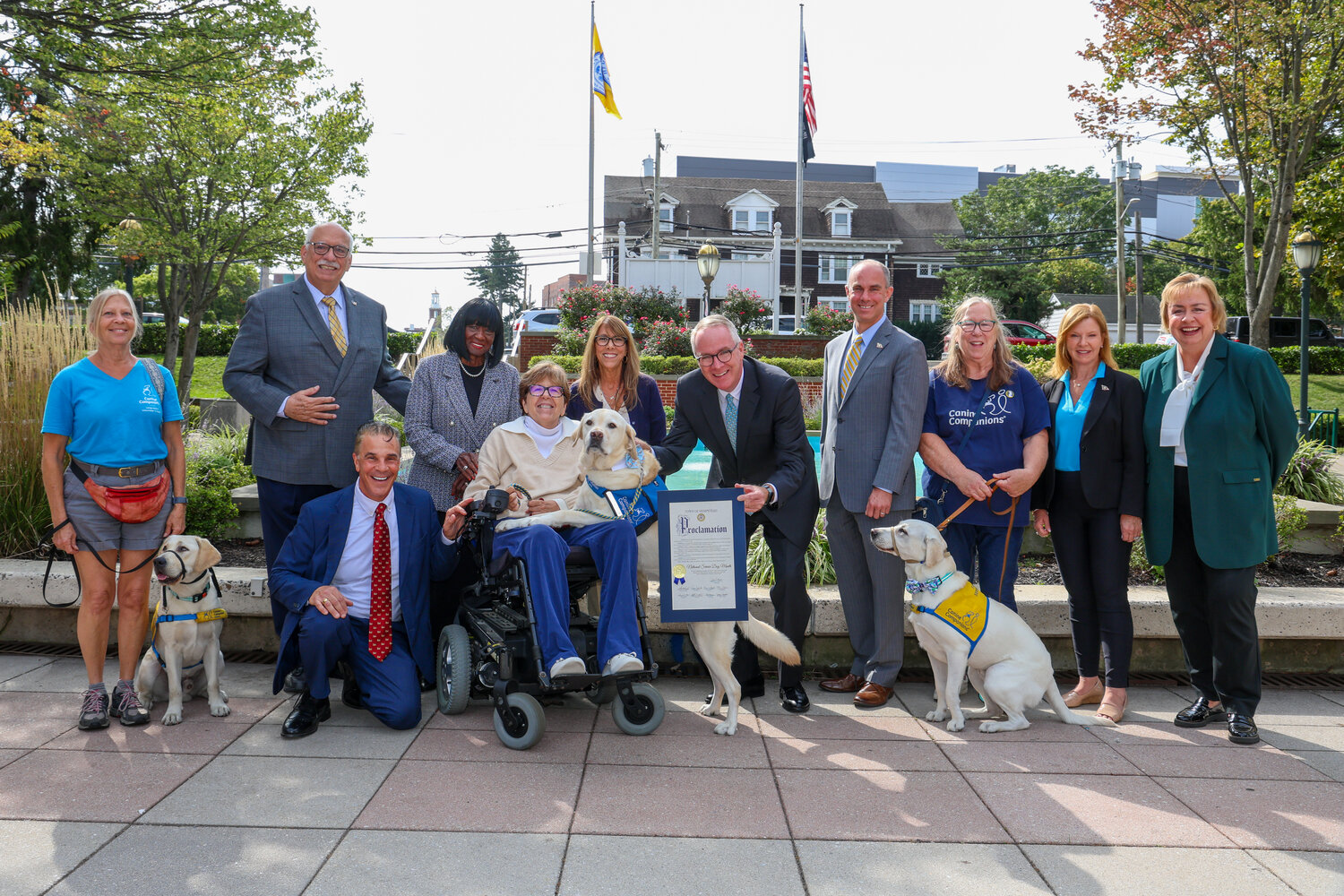Honoring very helpful furry friends in the Town of Hempstead
To those who depend on them, service dogs are much more than just pets. They help their human companions with mobility, stability, awareness and overall quality of life.
In many ways, they’re caretakers.
To recognize the vital help these dogs offer, the Town of Hempstead joined in the recognition of September as National Service Dog Month, partnering with Canine Companions’ Northeast Regional Training Center, in Medford, which strives to ensure that everyone who needs the help of a furry friend gets it.
One of those who has benefited from the organization’s work is former Long Beach City Councilman Liz Treston, who has used a wheelchair since her spinal cord was damaged in an accident three decades ago. Treston has been involved with Canine Companions ever since, and jokes that it’s one of the longest relationships she’s ever had. She began working with her fifth service dog, MacGyver, in 2019.
A white Labrador retriever, MacGyver has been a constant help to Treston. When she served on the City Council, he would wait patiently for her signal for him to join her on the dais at meetings in City Hall after she maneuvered to her seat in an electric lift, and he would stay by her side until the meetings concluded.
“Not to use a pun, but they truly are a different breed,” Treston said. “Service dogs help so many different disabilities — visually impaired, hearing impaired and more.”
“Canine Companions is the nation’s first and largest service dog organization,” John Betzinger, the public relations and marketing coordinator for the Medford center, said. “We serve people with all disabilities, other than blindness. Our dogs know over 40 advanced commands that are useful to a person with disabilities.”
The dogs are a trained in variety of tasks, including picking up a dropped cellphone and handing a credit card to a cashier. Some are taught to wake up a person who is having a nightmare brought on by post-traumatic stress disorder, and others can alert a person who is deaf when the doorbell rings. Whatever a person with a disability needs help with, they can do.
Canine Companions breeds Labs and golden retrievers, with most being a mix of the two. Every dog is free for those who need them. The organization has volunteer “puppy raisers” around the country, who spend about a year and a half teaching young dogs basic commands. The four-legged trainees are then put through their paces in a six-month-long program with Canine Companions’ professional trainers. After a total of two years, they have learned how to open and close doors, turn lights on and off, and much more.
“It’s really an amazing thing,” Betzinger said. “All Canine Companions services are free of charge. It costs us well in excess of $50,000 to raise and train these dogs, and we give them away for free, thanks to the generosity of our donors.”
People like Treston, who need service dogs, undergo an extensive application process. There’s paperwork and in-home interviews, and once a match is made between a person and a dog, the “people training” begins.
Treston spent two weeks in the training center in Medford, staying in a “dorm room.” She learned how to use the commands a service dog learns as well as how to care for the animal, which included lectures by veterinarians to help her prepare.
“It’s quite a process, and there’s teamwork involved with it,” Betzinger said. “At the end of two weeks, we have really great graduation ceremony, and the volunteer pup raisers are invited back, and they get to meet the new team and see their dog again that they haven’t seen in six months.”
Now, after being with MacGyver for five years — and with Canine Companions for 30 — Treston willingly testifies to the importance of service dogs. She did not need to be persuaded of the importance of recognizing them last month.
“This is their actual job,” she said. “To me, as a person with a disability, they’re a piece of medical equipment. They’re an extension of my wheelchair, an extension of my functionality. As a person with a disability, they give me more independence.”






